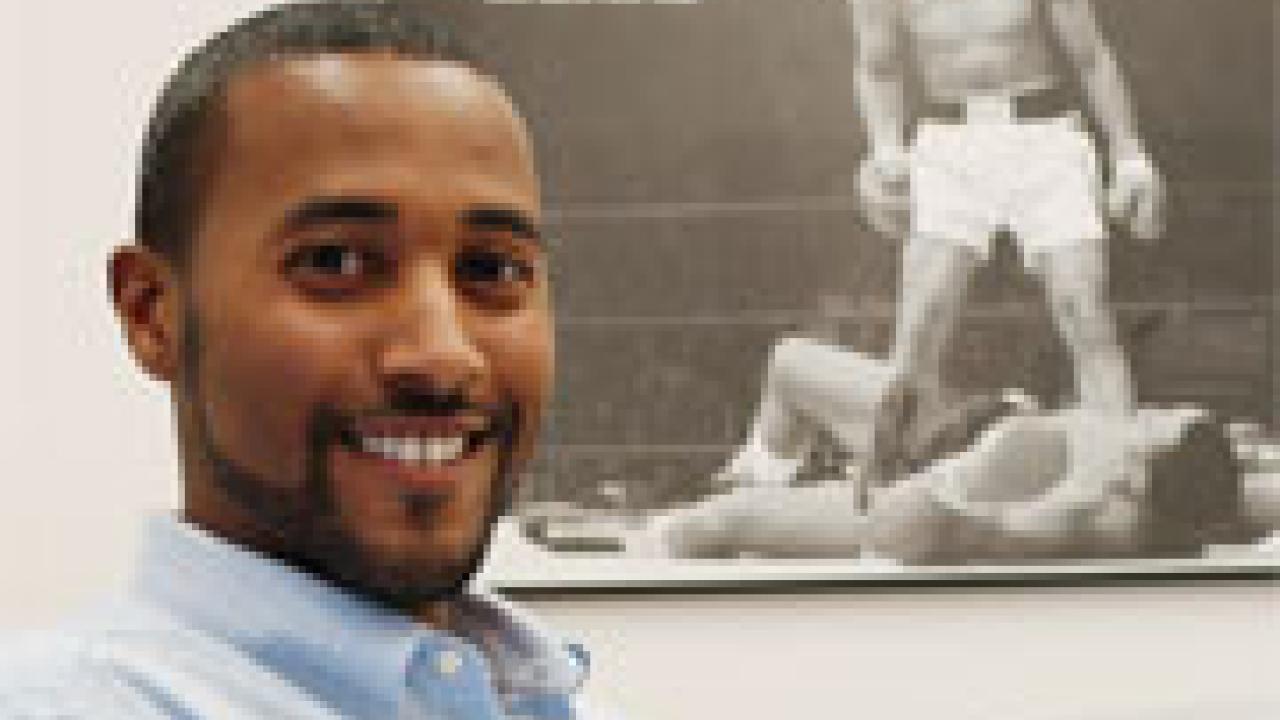Ross Flowers says the transition from high school to college will test a student-athlete like few high-stakes games ever could.
"In high school these players were the proverbial big fish in the little pond," said Flowers, a psychologist at UC Davis in Counseling and Psychological Services and for the Intercollegiate Athletics Department. "Suddenly, in college, they are the little fish in the big pond, and they are competing in a more concentrated talent pool of student-athletes."
Flowers, who counsels on average 15 student-athletes a week at UC Davis, says the college transition is the most frequent problem he encounters with student-athletes. Along the way athletes can lose their confidence or find solace in any of the numerous distractions in a college environment.
"When confronting a challenge like this," he said, "it is important to learn how to relax, focus, motivate oneself, manage your time and find positive, supportive relationships."
The balancing act for UC Davis student-athletes is all the more important these days with the university in the midst of its move to Division I that will become official in 2007-08.
"It's not that different, but our programs seek to be competitive at this new level," he said.
Overcoming his own hurdles
Flowers should know about the inner mind of the athlete. In high school, he won the 110-meter hurdles in Washington state in 1988 and 1989 and then became an All-American and Pac-10 champion at UCLA. Perhaps the greatest hurdle he cleared was recovering from stress fractures in his shins while a freshman at UCLA -- he has a titanium rod in his leg that stretches from his knee to his ankle.
"I felt like I was losing my identity as an athlete," added Flowers.
He had surgery during his sophomore year, and the ordeal gave him time for introspection about life beyond athletics. "I became more aware of my family life, spiritual life and values outside athletics. I integrated this back into my sport and became a better athlete and a more well-rounded person," he said.
Flowers went on to become the captain of the UCLA men's track and field team his senior year. Following graduation from UCLA, he competed nationally and internationally in the 110-meter high hurdles. And he earned his doctorate in psychology at the University of Missouri, Kansas City.
While at that university he coached the men's and women's track teams, which had never won a title before. But under Flowers they won six conference championships.
A firm believer in the powers of relaxation, Flowers often suggests deep breathing exercises as a way "to center oneself in the moment and clear away the distractions." He noted, "You focus only on what you can do and dedicate yourself to the present moment."
Flowers talks to student-athletes in both big and small groups as well as individual sessions in his North Hall Office. He works with coaches on particular issues facing teams and may speak to an entire squad about motivational issues.
"Ross has certainly made a positive impact to our program," said MaryClaire Robinson, women's soccer coach. "He brings a different aspect to the competition. We spend a lot of time preparing on the technical side, the team's shape and on tactics. Ross completes the picture in terms of the mental aspects of the game. While not tangible, these certainly make an impact on our student-athletes and the program's success."
Fear is a prevalent issue, whether it's about coping with failure or injury rehabilitation. "We talk about those fears and address them," said Flowers. "We discuss what is inside one's control, for example, how you can manage the pain of an injury."
Visualization is one tool he often uses with athletes. "We talk about envisioning each step of progress toward the desired goal. You close your eyes and paint a picture in your mind."
He said an athlete may use visualization techniques three to five times a day in the build-up toward the game or event. "That way you've done it 50 times in a week before you actually compete," said Flowers. He is also a believer in positive psychology, which, to oversimplify it, puts an emphasis on the strengths and virtues that constitute character. "We build the individual up based on their many talents and traits."
In counseling, Flowers notices a gender gap -- more female student-athletes make appointments than males. "Women tend to feel more comfortable talking individually about the issues they are dealing with," said Flowers, who often speaks to males in large group settings.
For Flowers, the parallels between sports and mainstream society are clear. "A lot of what happens in sports -- from the challenges to the adjustments and coping with success and failure -- happen in life. And so we teach our students to apply this knowledge and wisdom to their careers and lives beyond college."
'A rough situation'
Flowers arrived at UC Davis in 2001. A newly minted doctor of psychology, he served as an intern in the Counseling and Psychological Services unit where he started developing the sports psychology service. It grew into a full-time job and a consulting role to Intercollegiate Athletics.
Growing up in a Seattle neighborhood -- "a rough situation, what they call the 'hood,'" Flowers noted -- he fell in love with soccer and basketball. Then he started running track and setting records while earning a 3.5 grade-point-average, all of which prompted UCLA to offer him a full scholarship. Along the journey of his life, he has learned many lessons.
"It's important to understand the demands of balancing academics, athletics and a social life in a demanding environment," Flowers said.
Along his personal journey, one of Flowers' greatest sources of inspiration is the legendary boxer Muhammad Ali. "You see confidence in him, whether inside or outside the ring. Look at how poised he was and how he carried himself. He did not let outside distractions affect him."
Media Resources
Clifton B. Parker, Dateline, (530) 752-1932, cparker@ucdavis.edu
